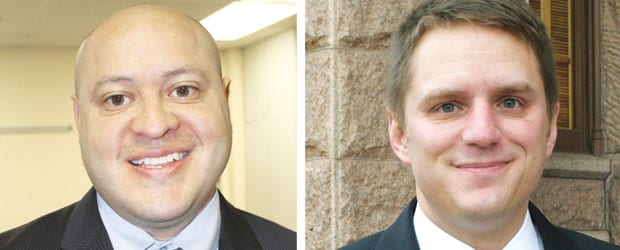Why city council elections matter to LGBT people
JAMES RUSSELL | Staff Writer
On May 9, area voters will cast their votes for nonpartisan elected offices — like city councils, school boards and other special purpose districts. And while the day-to-day obligations of a local elected official may not be the most riveting of work, those officials are still important, especially to the LGBT community.
“In some ways our attention is on national and international issues, but local decisions are some of the most important decisions to impact our livelihood,” said James Riddlesperger, a professor of political science at Texas Christian University who studies Texas politics.
“Issues like streets, water and transportation may not be sexy issues, but when [something] doesn’t work we notice. Local governments are ingrained in our daily lives [even if] we take the issues for granted,” he noted.
Because local governments also transcend partisan politics, voters are less likely to see the type of gridlock seen at the national level. Local elections benefit the LGBT community because voters won’t see the same contentious stand-offs like we’ve seen at the national level between the Republican-controlled Congress and a Democratic president. In comparison, at the local level, “there’s hope for compromise,” Riddlesperger said.
But aside from day-to-day issues, there’s another reason for LGBT people to run to the ballot box in local elections. In a state like Texas, which currently lacks statewide recognition of the LGBT community, local entities and corporations are the best way to ensure LGBT equality and recognition.
Rafael McDonnell, Advocacy and Communications Manager at Resource Center, works with local governments on pro-LGBT policies and ordinances.
“From a general perspective, the local level has been where people have been able to make changes,” he said. “That’s why we here at the center have pursued employment nondiscrimination policies at a variety of governmental and non-governmental bodies here in North Texas.”
Aside from the right-wing opposition to some ordinances, such as the Houston and Plano Equal Rights Ordinances, nondiscrimination policies are seen as fairly nonpartisan, McDonnell added. “Support among the general public for nondiscrimination policies cuts across multiple lines [including] race, religion and political affiliation. At the municipal level, and at some of the governmental bodies that we have worked with, you are dealing with people who were elected on a nonpartisan basis.”
Riddlesperger, the political science professor, added that because local governments are large employers, there’s a sense of accountability to the community as well. He cited issues like extending partner benefits to same-sex couples and reforms in the police department instituted by former Fort Worth Police Chief Jeff Halstead and LGBT activists following the 2009 Rainbow Lounge raid.
Though a race with an out LGBT candidate can be contentious at the national or state level, Riddlesperger said identity politics is more of an undercurrent in local elections. But Denis Dison, senior vice president with the Gay and Lesbian Victory Fund, an organization that works to elect LGBT leaders, disagreed. “People who say that often want it to be true,” Dison suggested.
Candidates running against an out LGBT candidate can always use codes to gay-bait their opponent without seeming to do so. When former Fort Worth City Councilman Joel Burns first ran to fill the council seat left open when Wendy Davis resigned to run for state senate, Burns’ sexual orientation and marriage to a man was fodder for his opponent. Despite the subtle anti-gay tactics, Burns ultimately won — and won re-election handily each time he ran.
Openly LGBT candidates and elected officials can bring a personal story into the mix when negotiating policy, which puts a face on the LGBT community which likely had previously seemed distant and foreign to some. “They can talk about, and contextualize, about what an issue means to them,” said the Victory Fund’s Dison.
As of press time, there is no openly LGBT candidate running against an incumbent for Dallas and Fort Worth city councils. Brent Rodgers, an openly gay Dallas businessman, dropped out of his race against incumbent Councilman Adam Medrano, who is running for re-election.
Currently six Dallas city councilors are term-limited and all others, including Mayor Mike Rawlings, are running for-election. While the majority of the Dallas City Council members are LGBT allies, there are opportunities to elect fresh faces and LGBT allies. For example, anti-LGBT councilwoman Vonciel Jones Hill is also among those term limited.
Given the lack of out elected officials at both the state and local levels in Texas, McDonnell also stressed the importance of allies, since the number of allies in office is greater than the number of out LGBT elected officials.
Dison said despite popular belief, LGBT issues have been stonewalled both nationally and statewide. “While we are experiencing [advances in] marriage equality in the courts, if you look at what is happening at the municipal level, there’s not much traction. The far right, conservative elements are blocking any legislation,” he said.
And that is reason enough to take interest in those local races that will be decided in May.
This article appeared in the Dallas Voice print edition February 13, 2015.


